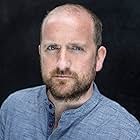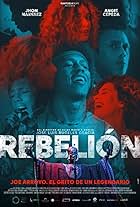Ajouter une intrigue dans votre langueRebellion is a five part serial drama about the birth of modern Ireland. The story is told from the perspectives of a group of fictional characters who live through the political events of t... Tout lireRebellion is a five part serial drama about the birth of modern Ireland. The story is told from the perspectives of a group of fictional characters who live through the political events of the 1916 Easter Rising.Rebellion is a five part serial drama about the birth of modern Ireland. The story is told from the perspectives of a group of fictional characters who live through the political events of the 1916 Easter Rising.
- Récompenses
- 1 victoire et 7 nominations au total
Parcourir les épisodes
Avis à la une
This is a very pretty, but confused telling of the 1914-1922 period in Ireland. There are too many characters who look and talk the same, and have little to distinguish them.
More significantly, we are given no idea that in the decades leading up to 1914 there actually were three different factions in Ireland with regard to the country's membership in or relationship to the United Kingdom:-
-The Unionists, who regarded Ireland as 'West Britain' and wanted no autonomy for Ireland at all.
With regard to the last, it's notable that this TV series leaves out the essential fact that rebellion in Ireland was initiated not by the Republicans but by the Unionists.
In 1914, just before Home Rule was to be put in effect, Unionist officers in the Curragh Barracks in Dublin declared themselves in defiance of the British government and readied for armed revolt. This so-called Curragh Mutiny was defused by the outbreak of the Great War. But it's crucial to know that it was senior British officers in Ireland, not Republicans or Home Rulers, who first rebelled and set the stage for the civil wars that followed. Without this backstory, the events set forth in 'Rebellion' really make no sense.
More significantly, we are given no idea that in the decades leading up to 1914 there actually were three different factions in Ireland with regard to the country's membership in or relationship to the United Kingdom:-
- Home Rule campaigners: they were the dominant political movement in Ireland. They looked to have the Irish Parliament reestablished in Dublin, as it had been prior to 1801. This initiative was finally passed by the Parliament in Westminster in 1913-1914, and would have been put in force had it not been for the outbreak of war in August 1914.
- Irish Republicans, or so-called Fenians: this was a small but vociferous minority that sought withdrawal from the UK and a total break from Great Britain. Unlike the Home Rulers, the Republicans preached armed revolution. ('Rebellion' suggests that this was the main independence faction in Ireland, but it most certainly was not.)
-The Unionists, who regarded Ireland as 'West Britain' and wanted no autonomy for Ireland at all.
With regard to the last, it's notable that this TV series leaves out the essential fact that rebellion in Ireland was initiated not by the Republicans but by the Unionists.
In 1914, just before Home Rule was to be put in effect, Unionist officers in the Curragh Barracks in Dublin declared themselves in defiance of the British government and readied for armed revolt. This so-called Curragh Mutiny was defused by the outbreak of the Great War. But it's crucial to know that it was senior British officers in Ireland, not Republicans or Home Rulers, who first rebelled and set the stage for the civil wars that followed. Without this backstory, the events set forth in 'Rebellion' really make no sense.
I am 85, I was not there, but met Irish (Republic) people in 1949 in Bradford UK, who had relatives alive and emotionally in this historic event. I was 18 (and from a small community) I was forever imbued by the emotions I witnessed, and the varied descriptions. The programme literally had me saying prayers, I was captivated, excited and horrified with the poverty depicted, which I was personally familiar with, being moved about during the WW11. This is a highly enthralling programme, I was very disappointed to learn that episode 5 is the last one. For me the realism was total, the emotions entirely believable. Casting and acting magnificent. I watched the 5 episodes on Netflix.
Beautifully made. But they replaced three perfectly good female characters with three others, while keeping many of the other (male?!) players in situ for season 2. Not only did this complicate and confuse but frankly dissolved my enthusiasm. I think it undermines the story itself, since everything other than the headlines are fictional.
The most important things to know about the Easter Rising were that it marked the return to violent rebellion in Ireland and the way that the English dealt with it started the turning the sympathies of the Irish at large against the English and the idea of home-rule as part of the Empire. Those two things are very well demonstrated in Rebellion, from the brutal dealing of the British military with both the rebellion and Irish civilians, the complete lack of due process for those arrested and executed, creating martyrs and setting the stage for the War of Independence and the Irish Civil War.
I saw this on Netflix and it starts in 1914 where we meet a group of Dubliners, some of whom are still loyal to an ever distant British Crown and others who are confined by the bonds of a colonial power that has abused and neglected its closest colony for hundreds of years – rebellion is in the air.
This has many of the real people at the time being portrayed including Padraig Pearse and James Connolly to name but two. But it is really told through the eyes and experiences of three women – a touch I liked very much. We have five succinct episodes that chart the road to the 1916 uprising and the consequences and I have to say I thought it was excellent.
Now there are some critics who say this is a trivialised account by the state owned RTE television company and as such has airbrushed a lot of the important details. It may well have done but there is still enough here to give a real flavour of what the times were like.
It is a big budget affair too with some stellar performances including Brian Gleeson and Ruth Bradley but no one does a bad job at all. I loved the period detail and the use of Gaelic in parts added to the authenticity and made me realise my Gaelic is sorely rusty. The action scenes are excellent too with all the tense atmosphere and raw emotion pouring off the screen. Historical licence aside this is still an ambitious and well realised TV series. My only real complaint is I wanted it to go much farther and would love a second season or maybe even a third – truly recommended.
This has many of the real people at the time being portrayed including Padraig Pearse and James Connolly to name but two. But it is really told through the eyes and experiences of three women – a touch I liked very much. We have five succinct episodes that chart the road to the 1916 uprising and the consequences and I have to say I thought it was excellent.
Now there are some critics who say this is a trivialised account by the state owned RTE television company and as such has airbrushed a lot of the important details. It may well have done but there is still enough here to give a real flavour of what the times were like.
It is a big budget affair too with some stellar performances including Brian Gleeson and Ruth Bradley but no one does a bad job at all. I loved the period detail and the use of Gaelic in parts added to the authenticity and made me realise my Gaelic is sorely rusty. The action scenes are excellent too with all the tense atmosphere and raw emotion pouring off the screen. Historical licence aside this is still an ambitious and well realised TV series. My only real complaint is I wanted it to go much farther and would love a second season or maybe even a third – truly recommended.
Histoire
Le saviez-vous
- AnecdotesTwo members of the Game of Thrones cast are in the series, Michelle Fairley (as Catelyn Stark) and Ian McElhinney (as Barristan Selmy).
- GaffesThe British officers are seen with rank insignia on their shoulders. While some officers did this in the trenches in 1916 it was not adopted officially and outside of France until 1917.
- ConnexionsFeatured in Jeremy Vine: Épisode #2.84 (2019)
Meilleurs choix
Connectez-vous pour évaluer et suivre la liste de favoris afin de recevoir des recommandations personnalisées
Détails
Contribuer à cette page
Suggérer une modification ou ajouter du contenu manquant




































